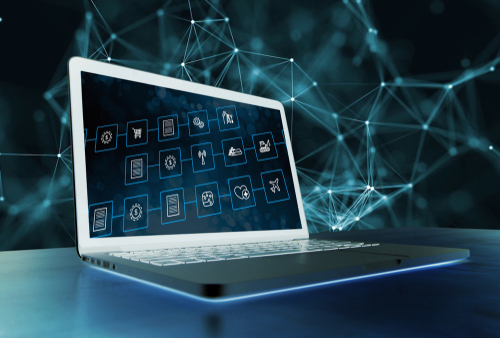



Get new exclusive access to healthcare business reports & breaking news




‘Blockchain’ has become something of a buzzword in the past year or so.
Fundamentally, blockchain refers to a distributed system of recording and storing transaction records. Information is stored in a digital ledger, and is a shared, peer-to-peer network of immutable data.
The attractiveness of the blockchain lies in the fact that it requires no central authority — records are stored and distributed among all participants, and the network handles verification processes at an extremely reliable level. The blockchain also ensures that all interactions are recorded in an unalterable audit trail.
Although blockchain has been popularly utilized in the trading of cryptocurrency, the technology also has the potential to transform the healthcare industry.
Healthcare Weekly explores 7 applications of blockchain in healthcare:
Using blockchain technology, patient records can be accessed securely and reliably. In addition, patients can share their entire medical histories anonymously with researchers and healthcare organizations — thereby increasing the efficiency of data-driven processes such as new drug discovery.
One company encouraging this kind of data sharing is Hu-manity. As reported by Healthcare Weekly in late July, Hu-manity.co allows users to sell their medical data directly to large pharmaceutical companies, eliminating the need for a middleman. The company leverages blockchain in healthcare to allow patients to share their data and negotiate terms of consent with large companies.
Blockchain networks provide a centralized arena for all clinical trial-related data. Researchers have access to larger amounts of more reliable data than ever before, aiding clinical studies. This is especially useful in healthcare’s current climate wherein each state abides by its own consent laws. Rapid information sharing via the blockchain means all consent-related information is stored in one place.
Using blockchain in healthcare also means that organizations can share data with external stakeholders — such as regulatory agencies and sponsors — as well as share data over multiple clinical trial sites and locations.
Micropayments — or small rewards given to patients for sticking to their healthcare plans — are gaining popularity. The blockchain offers an easy, efficient way to provide monetary incentives, and ensures that patient data is of the highest integrity possible.
For example, patients could receive micro-payments when large pharmaceutical companies perform analytics on their data — this process is far more streamlined using the decentralized structure of a blockchain network.
A number of healthcare service providers are reportedly looking at blockchain as a way to monitor their supply chain workflows.
Healthcare companies could record important information about products — such as the side-effects of a certain drug, or whether a product has gone through a round of regulation — and use the blockchain to reliably store it. The integrity of the network would ensure that products of lower quality can be quickly flagged and improved.
Using a blockchain means that fewer copies of intra-company information ledgers need to be made, and that those that exist are at far less risk of falling prey to malicious attacks.
“Distribution makes the system more secure, because there isn’t a single place of attack or failure,” says Andy Lippman, a senior research scientist at MIT and the co-author of a white paper on the potential use of blockchain technology to improve electronic health records.
Since a blockchain network is by nature immutable, it provides a surefire way to confirm insurance claims or identify falsified ones — for instance when multiple claims are filed over one issue. Information about a patient’s drug prescriptions, medical institution visits, or contracts are made readily available, and can accurately be verified at any given point in time.
This could have a large impact on Medicare and Medicaid, where payments and services need to be coordinated between a number of agencies.
Companies in other industries have started to accept cryptocurrency as a feasible form of payment.
Indeed, Wyoming-based Teledactyl eliminates payment through a third-party by providing payments through cryptocurrency, and claims that this hands control over healthcare services back to the patient — especially through reduced costs.
Whether cryptocurrency will become as significant a payment method in medical care as it is becoming in other industries, however, remains to be seen. According to Daniel Kivatinos, COO of drchrono, a software-as-a-service patient care platform company, this change will have to come from the healthcare insurance industry.
To learn more about the applications of blockchain in healthcare, read here.